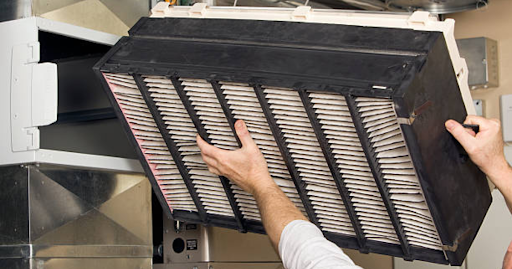What MERV Rating Is Best For Home Use?
You’re not alone if you’re wondering about what are the best air filters for home. Picking the right MERV rating for your ac filter replacement can significantly impact your indoor air quality and the efficiency of your HVAC system. So, let’s break it down.
Explanation of MERV Ratings
MERV stands for Minimum Efficiency Reporting Value. It’s a rating system that measures the efficiency of air filters, known as MERV filter ratings. The scale goes from 1 to 16, with higher numbers indicating more efficient filtration. Generally, a higher MERV rating means the filter can capture smaller particles.
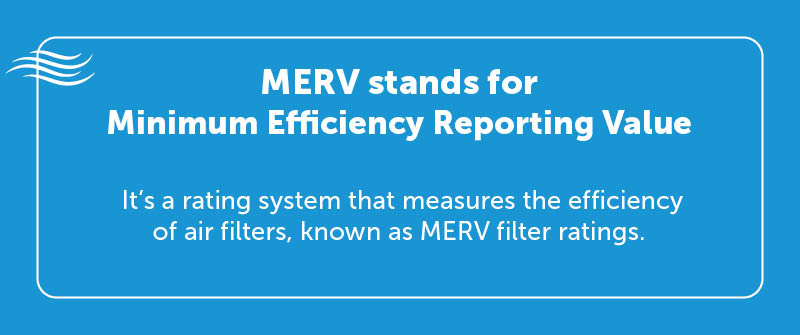
Benefits of Using Different MERV Ratings
Home MERV ratings usually range from 8 to 13. A MERV 8 filter is a common choice for homes. It captures larger particles like dust and pollen and balances air filtration and airflow well. On the other hand, a MERV 11 filter is more efficient and capable of trapping smaller particles like mold spores and finer dust. This makes it a great option for households with pets, allergies, or someone with respiratory issues.
Common MERV Ratings for Homes
Most residential HVAC systems use filters with a home MERV rating of 8 to Merv 13 filter. A MERV 8 filter is sufficient for most homes and ensures good airflow while keeping your air relatively clean. MERV filters with ratings of 11 and 13 offer higher levels of filtration, although they may slightly restrict airflow.
Factors to Consider When Choosing MERV Rating for an HVAC Filter
When selecting a residential MERV rating, several factors come into play:
- Health Needs: If anyone in your home has allergies or asthma, a higher MERV rating can help mitigate those issues.
- Pets: More pets mean more dander. A higher MERV filter can capture these particles more effectively.
- HVAC Compatibility: Check if your HVAC system can handle a filter with a higher MERV rating without compromising airflow.
- Local Air Quality: If you live in an area with high pollution or frequent wildfires, you might benefit from a higher MERV rating.
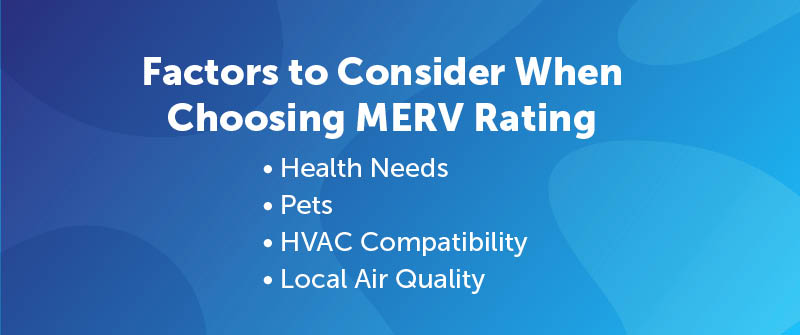
Air conditioning engineers recommend selecting the appropriate MERV rating for specific HVAC systems.
Considering these factors, you can choose a MERV rating that best fits your needs, ensuring you enjoy clean air without sacrificing your HVAC system’s performance.
Is MERV 11 Too High For Home?
When considering whether a MERV 11 filter is too high for home use, weighing the pros and cons is important. A MERV 11 filter captures a wider range of particles than lower-rated HVAC filters, including dust, pollen, mold spores, and some bacteria. This higher efficiency can significantly improve indoor air quality, especially in homes with allergy sufferers or pets.
Pros and Cons of MERV 11
One of the main benefits of a MERV 11 filter is its ability to trap finer particles, enhancing overall air quality. However, with increased filtration comes increased resistance to airflow. This can make your HVAC system work harder, potentially leading to higher energy consumption and wear. Additionally, restricted airflow could affect the system’s efficiency, especially if it isn’t designed to handle such a filter. It is important to change the air filter regularly to maintain efficiency.
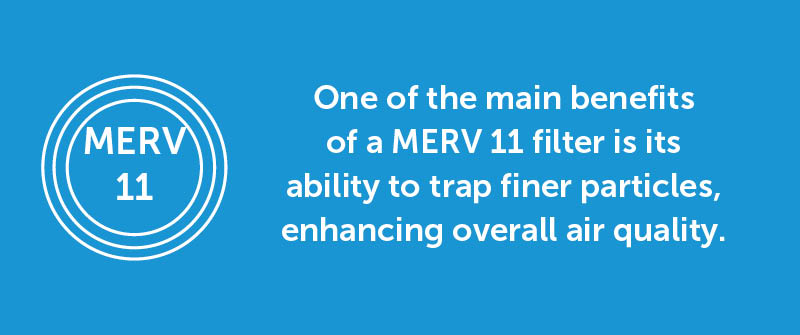
Impact on HVAC System
It’s crucial to check your HVAC system’s specifications before opting for a MERV 11 filter. If your system isn’t designed to handle the increased resistance, you might face issues such as decreased efficiency or potential damage to your HVAC unit. Regular maintenance and timely filter replacements can help mitigate these impacts.
When MERV 11 is Appropriate
A MERV 11 filter is particularly suitable for homes in areas with high pollution or for those with occupants who have respiratory issues. If you belong to these categories and your HVAC system can handle the added resistance, a MERV 11 filter can be an excellent choice.
Alternatives to MERV 11 for Home Use
If you’re concerned about which type of air filter will last the longest or have the higher resistance of a MERV 11 filter, consider opting for a MERV 8 or MERV 9 filter. These alternatives still offer good filtration capabilities while less restrictive, ensuring better airflow and potentially last longer.
Is MERV 11 Better Than MERV 8?
The question of whether MERV 11 is better than MERV 8 is a common one among homeowners looking to optimize their indoor air quality. The answer, however, largely depends on your specific needs and circumstances.
Comparison of MERV 11 and MERV 8
MERV 8 filters are standard and can capture larger particles such as dust, pollen, and pet dander. Higher MERV ratings can capture small particles like spray paint dust. On the other hand, MERV 11 filters step it up a notch by capturing smaller particles like smoke, smog, and even some viruses and bacteria, making them more efficient in improving the air quality inside your home.
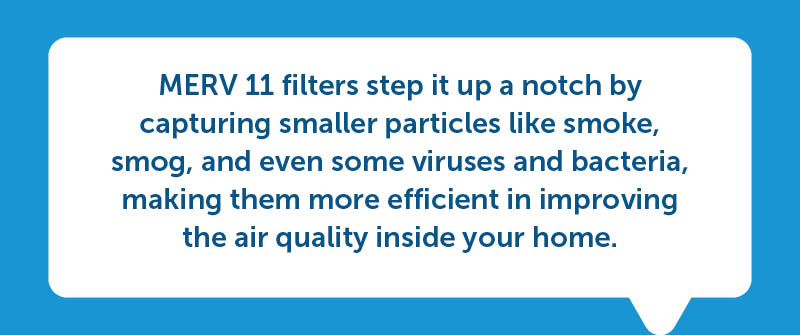
Air Quality Improvements
MERV 11 filters can drastically improve indoor air quality, especially in homes with individuals who suffer from allergies, asthma, or other respiratory issues. They are also beneficial if you live in an area with high pollution levels or if there are smokers in your home. However, for a typical household with no special air quality concerns, a MERV 8 filter may be more than sufficient.
Energy Efficiency Concerns
One drawback of using a higher-rated filter like MERV 11 is that it can be more restrictive to airflow, which might cause your HVAC system to work harder, potentially increasing energy bills. Before making the switch, it’s important to check your HVAC system’s specifications to ensure it can handle a higher MERV rating without losing efficiency.
Best Use Cases for MERV 8 and MERV 11
If you’re simply looking to maintain a reasonable level of air cleanliness and don’t have any specific issues like allergies or pollution to worry about a MERV 8 filter should suffice. However, if you’re aiming for a higher level of filtration to combat allergens, pollutants, or other fine particles, a MERV 11 filter would be a better option.
How Do I Know What MERV Rating To Use?
Assessment of Home Air Quality Needs
When determining what MERV rating to use for your home, the first step is to assess your air quality needs. This means evaluating the current air quality in your home and understanding any issues you might be facing. For instance, if you have members in your household with respiratory issues like asthma or allergies, opting for a higher MERV-rated filter can be beneficial. Higher MERV ratings can effectively capture smaller particles, such as pollen, dust mites, and pet dander, contributing to poor indoor air quality.
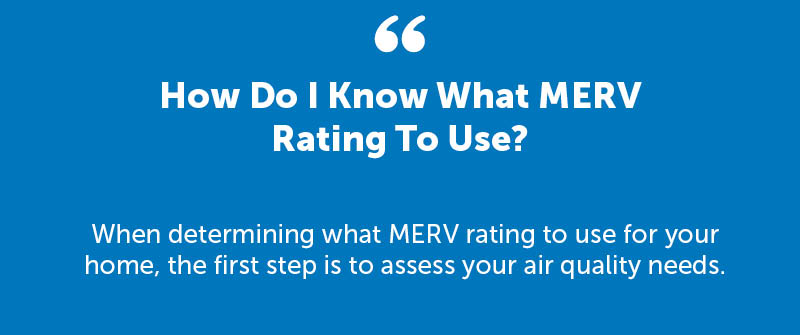
Consulting HVAC Specialists
Consulting HVAC specialists can be invaluable for those uncertain about making the right choice. HVAC professionals can offer tailored advice based on your home’s heating and cooling systems. They can also help you understand the compatibility of different MERV-rated filters with your existing system, ensuring you are not compromising performance or efficiency.
Consideration of Allergies and Pets
If you or anyone in your home suffers from allergies or has multiple pets, you’ll need to consider this when deciding on your furnace filter MERV rating. A MERV rating of 8 to 11 is generally recommended for homes with pets or allergy sufferers. These ratings can efficiently trap pet hair, dander, and other common allergens, making your home a healthier place to live.
Adhering to Furnace and AC Specifications
Lastly, it’s crucial to adhere to the specifications provided by your furnace or air conditioning manufacturer. The manual or a professional can guide your unit’s optimal MERV rating. Using a filter with a rating that is too high can potentially restrict airflow, causing your HVAC system to work harder and reducing its lifespan. Conversely, filters with a too low rating may not provide sufficient filtration, leading to poor air quality.
Conclusion
Choosing the right MERV rating for your home can feel overwhelming, considering many factors. However, let’s recap some of the main points to help make your decision a little easier.
Recap of Main Points
We’ve explored MERV ratings and discussed common ones used in residential settings, such as MERV 8 and 11. Each rating offers a certain level of filtration efficiency and impacts your system differently. For most homes, a MERV rating between 8 and 11 balances air quality and system performance.
We then examined the pros and cons of higher ratings like MERV 11. While they offer superior filtration, they can also be more restrictive and impact your HVAC system. Still, they’re excellent for homes with allergy sufferers or pets.
In comparing MERV 8 and MERV 11, we found that MERV 11 provides better air quality but might use more energy. In contrast, MERV 8 is often sufficient for general air quality improvement without putting much strain on your system.
Our guide on choosing the correct MERV rating highlighted the importance of assessing your home’s air quality needs, consulting with HVAC specialists, and considering specific factors like allergies and pets. Adhering to your furnace and AC specifications is crucial to ensure smooth operation.
Final Recommendations
If you have moderate air quality concerns and a standard HVAC system, a MERV 8 filter is usually a safe bet. However, moving to a MERV 11 might benefit those with specific health concerns or pets more.
Remember, it’s always a good idea to check with your HVAC specialist to ensure you choose the filter that best meets your needs without compromising your system’s efficiency.

Future Considerations for Home Air Quality
Air quality is an ongoing concern and can change with seasons, renovations, or new pets. Stay proactive by periodically reassessing your air quality needs and adjusting your filter accordingly.
Discover a wide range of air and water filters to keep your home fresh and clean. Find the perfect fit for your appliances and enjoy cleaner air and water today.

